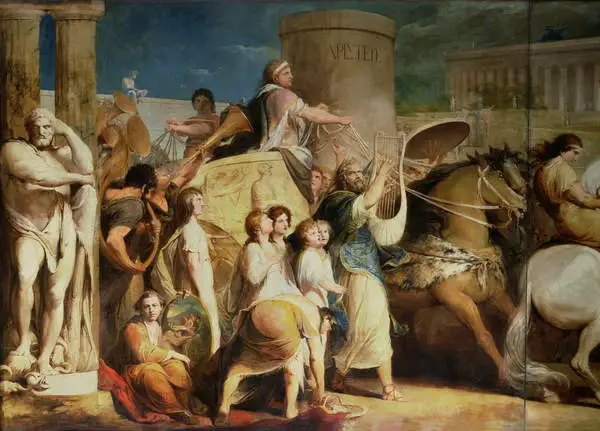Ancient Greece was a remarkable assemblage of over 1000 city-states situated in the northeastern Mediterranean. These city-states were linguistically and culturally interconnected, sharing a common Greek heritage. The physical geography of the Mediterranean region played a pivotal role in the development of these Greek city states.
The landscape of ancient Greece consisted of rocky, mountainous terrain and numerous islands, creating natural barriers that isolated population centers from one another. These physical obstacles contributed to the formation of independent and self-governing city-states. Each Greek city known as a polis, was organized around an urban center and its surrounding countryside.
A distinctive feature of these city-states was the presence of protective outer walls, which safeguarded the inhabitants and their possessions. The polis also encompassed a public space that housed significant structures such as temples and government buildings. Often situated atop a hill, known as the acropolis, these architectural marvels served as focal points for religious ceremonies and administrative functions. Let’s take a look at 7 of the most influential Ancient Greek City states of Antiquity.
Athens

From its historical significance as a prominent cultural hub to its modern-day status as the capital of Greece, Athens holds immense influence on the development of Western civilization. Renowned as the birthplace of democracy, this ancient city-state played a pivotal role in Ancient Greece.
The citizens of Athens held a deep appreciation for architecture, arts, and education. Within Athens’ boundaries resided eminent Greek philosophers, artists, and politicians, contributing to its rich cultural heritage. The landscape is adorned with architectural marvels from the classical era, including the iconic Acropolis, the imposing Arch of Hadrian, and the Temple of Hephaestus in the Agora.
The democratic governance system granted every citizen the right to participate in decision-making, as they convened at Pnyx Hill to cast their votes on crucial societal matters. The Ancient Athenians invested heavily in their navy, Recognizing the importance of naval power. They established the Piraeus as home to the largest fleet in ancient Greece, thereby safeguarding against foreign invasions.
Sparta

Sparta was one of the largest and most formidable city-states in ancient Greece. It stood out for its unparalleled military prowess. Renowned for their unparalleled fighting force, the Spartans possessed the strongest army among all Greek city-states. The Spartans are widely known for holding the entire Persian Army with just 300 men at the Battle of Thermopylae in 480 BCE and for their victory over Athens in the Peloponnesian War in 404 BCE.
In Sparta, every man was expected to serve as a soldier and underwent rigorous training from an early age. Alongside their military dedication, Spartans also had a fondness for sports, including footraces. Unlike the democratic governance of Athens, Sparta followed a unique system of dual kingship, complemented by a council of elders.
Social classes in Spartan society were hierarchically structured. The Spartans, who boasted ancestral ties to the city, occupied the highest position. The Perioikoi, who were new citizens that migrated to Sparta from other regions, held a distinct status. Meanwhile, the majority of Spartan society consisted of the helots, who served as agricultural laborers and servants to the Spartans.
Delphi (Pytho)

Regarded as the cultural hub of the ancient Greek world, Delphi held immense significance during the Classical Era. The Sanctuary of Apollo, located there, housed one of Greece’s most revered oracles, known as the Pythia. This influential figure, a respected woman in Greek society, possessed the ability to communicate with the god Apollo. People from diverse backgrounds and distant lands flocked to Delphi seeking the oracle’s guidance, elevating the city’s status as a pivotal ancient Greek destination.
Delphi also hosted the Pythian Games, a renowned athletic and equestrian competition held once every four years. Contestants from all corners of Greece vied for victory in these prestigious games, competing in various sporting events. The ultimate prize—a laurel crown—was crafted from the sacred tree of Apollo, further emphasizing Delphi’s connection to the god and solidifying its reputation as an indispensable center of ancient Greek culture.
Thebes
Thebes was a prominent city-state in ancient Greece that emerged as a fierce rival to Athens and Sparta. In ancient times, Thebes wielded formidable military might and betrayed their fellow Greeks by allying with Persian King Xerxes during the Persian War against the Greeks. In the Byzantine era, Thebes thrived as a bustling and industrious city, gaining fame for its diverse commercial endeavors, notably its opulent silk production.
Renowned as the birthplace of the Greek hero Hercules, Thebes is truly defined by its connection to the stories of Greek mythology. The city served as the backdrop for captivating tales of Cadmus, Oedipus, Dionysus, Heracles, and other legendary figures. Among its notable achievements, Thebes boasted the renowned Sacred Band, an esteemed military unit considered one of antiquity’s most elite.
While Thebes enjoyed great prominence during the late Classical period, its fate took a tragic turn with its destruction at the hands of Alexander the Great. Despite its eventual demise, Thebes remains forever etched in the annals of ancient history and mythology.
Syracuse

Syracuse, located on the southeastern coast of Sicily, was an ancient Greek city-state with a rich history. It was originally settled in 734 BCE by Corinthians led by Archias, and quickly established its dominance in the surrounding region. By the 5th century BCE, Syracuse had flourished into a bustling metropolis, attracting people from various parts of Greece.
Syracuse thrived under the rule of a prosperous aristocracy that generously supported the creation of awe-inspiring temples devoted to Zeus, Apollo, and Athena during its golden age. In parallel to Athens, Syracuse adopted a democratic system of governance, allowing its population to actively participate in shaping the city’s political landscape.
Notably, Syracuse boasted a grand theater capable of accommodating up to 15,000 spectators. Adorned with terraces and stone statues, it served as a vibrant center for entertainment. Additionally, the city constructed an aqueduct that supplied fresh running water to its citizens, highlighting its advanced infrastructure.
Corinth

Corinth, a significant city in ancient Greece, held a prominent position as one of the largest and most influential centers. It served as a vital hub for trade and culture, attracting a population of 90,000 people by 400 BCE. Throughout history, Corinth experienced the influences of various civilizations, including the Byzantines, Venetians, Ottomans, and even pirates, whose legacies can still be observed in the captivating towns and villages that adorn the landscape.
One of Corinth’s notable treasures is the Temple of Apollo, constructed around 560 BCE. This magnificent structure stands proudly just below the towering Acrocorinth, the fortified acropolis that overlooks the city. The Temple of Apollo stands as a testament to Corinth’s rich heritage and architectural prowess, captivating visitors with its timeless grandeur.
Pella
Pella, a remarkable Greek city situated in Central Macedonia, holds significant historical significance as the former capital of the ancient Greek kingdom of Macedon and as the birthplace of the legendary Alexander the Great. Once established, Pella swiftly rose to prominence, becoming the largest and most prosperous city in Macedonia. It thrived notably during the reigns of Cassander and Antigonus II.
However, Pella’s fortunes took a turn in 168 BC when it suffered a devastating sack by the Romans during the Third Macedonian War. This event marked the beginning of a gradual decline for the city, as its prominence waned and its significance was overshadowed by the neighboring Thessalonica.
